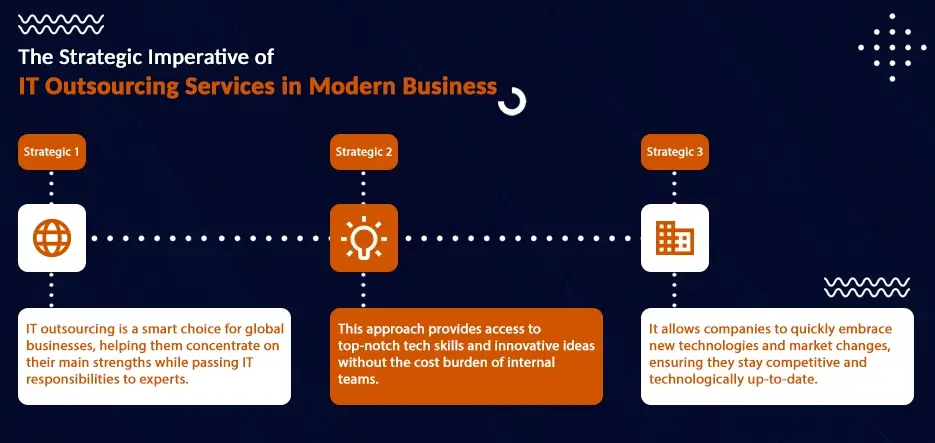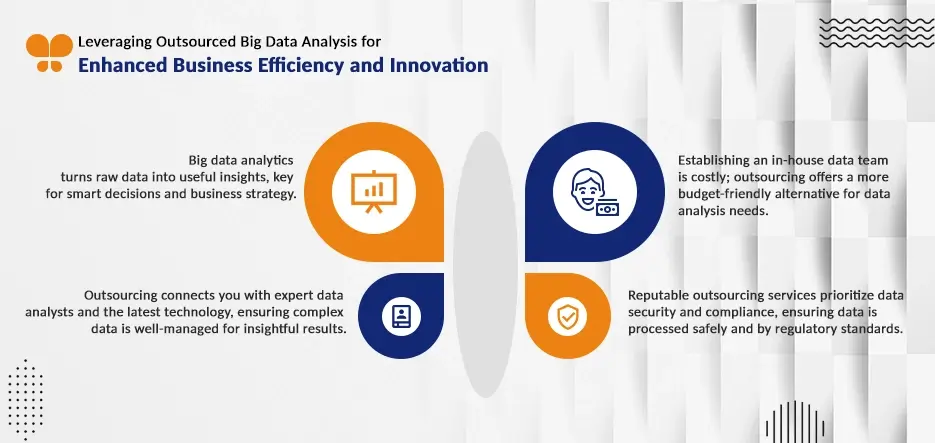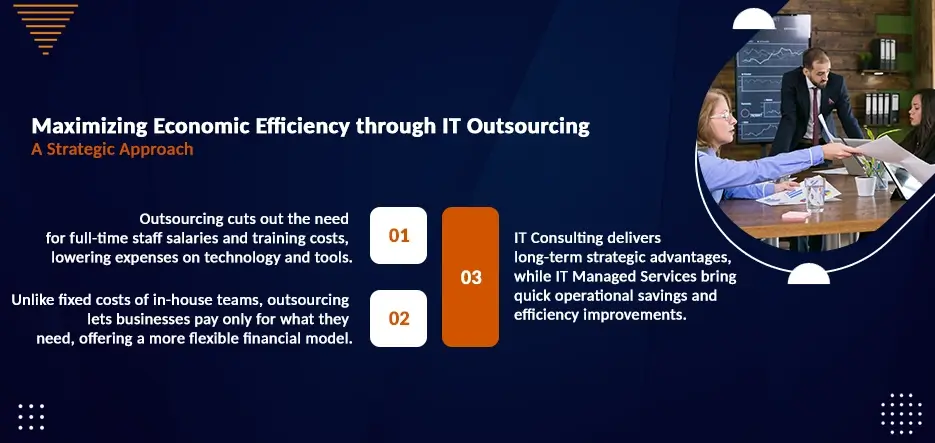Table of Contents
IT outsourcing services are pivotal in today’s technology and business world. This approach involves hiring external experts to manage various IT operations. These include infrastructure management, software development, and maintenance. IT outsourcing’s key benefit is providing businesses with excellent technological skills and innovative solutions. This is achievable without the cost of internal teams. A Statista report shows the global IT outsourcing market will be worth about 512.50 billion U.S. dollars in 2024, displaying the industry’s vast scale and impact.
In the IT sector, outsourcing is more than a trend. It’s a strategic choice for companies globally. It allows businesses to concentrate on their primary strengths and entrust IT tasks to expert providers. These tasks range from everyday IT upkeep to intricate activities like custom enterprise software development. Outsourced IT services’ adaptability and growth potential are unmatched, offering great value to companies of various sizes. Deloitte’s study shows that 70% of companies outsource to cut costs, emphasizing the financial advantages of this strategy.

In our fast-changing tech world, keeping up with new technology is vital. IT outsourcing services are key in this area. They allow businesses to quickly adjust to new tech and market changes. This quick adaptation is crucial for staying competitive in a market where tech expertise often leads to success.
The Evolution of IT Outsourcing
IT outsourcing services have changed a lot over time. At first, it was mainly for saving money. Businesses would outsource simple tasks like data entry and managing payrolls.
Companies began offshoring to places like India. There, they found skilled workers who didn’t cost as much. Now, the work included more than just everyday tasks. It covered things like customer support and managing databases.
The last ten years have changed IT outsourcing. We’ve moved from the old ways to new, team-based methods. The growth of cloud computing and service-based models has changed how companies outsource IT services. Now, businesses look for partners who can offer new solutions and help with their strategies.
Lately, there’s a trend towards specific, valuable services. More businesses want things like custom software development, especially in the USA. This shows that outsourcing is becoming a key part of business plans.
Another big change is in outsourced managed IT services that are outsourced. Companies aren’t just giving out tasks; they’re letting outside experts handle entire IT areas.
Artificial Intelligence (AI) in IT Outsourcing
Artificial Intelligence (AI) is changing IT outsourcing services dramatically. In custom software development outsourcing, AI reshapes strategies. AI isn’t just trendy; it’s a vital tool that changes how companies manage IT services.
AI in IT outsourcing moves from old, manual ways to smarter, automated methods. Technologies like machine learning and natural language processing are leading.
For companies, this means getting AI-driven services that boost operational efficiency. Jobs needing lots of human effort, like analyzing data or some software development tasks, are now handled better by AI. This change speeds up services and improves quality, letting companies use their staff for more strategic, creative work.
In custom software development outsourcing, AI is key. It smoother software development, from the first design step to the final launch. AI uses data to help make smarter software design choices. This is great for companies wanting custom solutions.
AI’s ability to predict is a big win for companies. Take predictive maintenance as an example. AI can predict when machines might fail. This is super useful for firms using lots of machinery. By outsourcing AI-driven maintenance, they can avoid costly breaks and keep things running smoothly.
AI also makes a big mark in customer service within IT outsourcing services. AI tools like chatbots and virtual assistants handle lots of customer questions. They give fast and right answers, making customers happy and lightening the load for human service agents. A study says AI could raise business productivity by up to 40%.
To sum up, AI in IT outsourcing shows how the tech field keeps evolving. As businesses look for more efficient, new solutions, AI in services like custom software development outsourcing and offshore software development company is increasingly important. It’s not just about keeping up with tech trends; it’s about using these advancements for real business gains.
Streamline your Business with IT Outsourcing Services
The Rise of the Internet of Things (IoT) in Outsourcing
The Internet of Things (IoT) is reshaping IT outsourcing services, especially for small businesses and custom software development companies in the USA. IoT links devices to share data, bringing new, efficient solutions to IT services.
IoT in IT outsourcing leads to smarter, connected processes. This is great for small businesses using outsourced IT services, as they get advanced tech without high costs.
IoT changes things in areas like manufacturing and healthcare. For example, IoT tracks equipment performance in manufacturing, tells when to do maintenance, and makes production smoother. This means less downtime and more efficiency. In healthcare, IoT, like health monitors, changes patient care. It allows remote check-ups and treatments based on data.
The Internet of Things (IoT) will be a significant breakthrough in the coming decade. The demand for outsourcing IoT services, including system integration and software development, is projected to grow exponentially. – Amelia Jacob
IoT in Different Industries
- Smart Building Management: A real estate company uses IoT for building management. Sensors controlled energy, security, and maintenance, cutting energy costs and making buildings safer.
- Retail Inventory Management: A retail store teamed up with an IT firm for IoT in inventory. Sensors tracked stock, automated orders, and gave real-time data.
- Healthcare Patient Monitoring: A health provider worked with an IT firm on an IoT system for watching patients’ health. Wearable devices tracked the health and alerted staff to any issues. This improved patient care and made monitoring easier.
It’s key to know Outsourcing Vs Offshoring Software Development. Outsourcing means hiring external firms for certain jobs, while offshoring means moving these jobs to another country, often to save money.
Outsourcing to specialized IoT firms brings expertise and new ideas, usually within the same country. Offshoring can be cheaper, especially for big, complex IoT projects.
Outsourced IT services for small businesses are often better. It lets them use IoT tech without needing a lot of resources. For example, a custom software development company in the USA might outsource IoT work locally for clearer communication and to meet their business needs.
In conclusion, IoT’s growth in IT outsourcing services marks a move towards more connected and efficient operations. Through outsourcing or offshoring, IoT lets businesses, especially small ones, innovate and enhance their processes in new ways.
Cloud Computing: A Pillar of IT Outsourcing
Cloud computing is reshaping IT outsourcing services. It changes how businesses use IT resources. A custom mobile application development company and cloud services have become central to IT plans.
Using cloud services in outsourcing means getting IT help over the Internet. This lets businesses use computing power as needed without the high costs of owning IT gear. The shift to cloud services meets the needs to grow, save costs, and quickly change to new market demands.
For businesses, especially custom mobile app development firms, cloud computing is a strong base for making, testing, and implementing apps. It lowers the need for big investments in machines. Cloud platforms also give tools and services that speed up making apps and help teams work together better.
The shift to cloud-based solutions is significant in IT outsourcing. Cloud outsourcing offers cost savings, scalability, and security benefits, making it a popular choice for businesses transitioning to the cloud.
Perks for Companies
Here are the main benefits of using cloud computing in IT outsourcing:
- Scaling and Being Flexible: Cloud services let businesses change their tech use based on their needs. This is key for companies with changing work needs or quick growth.
- Saving Costs: Outsourcing cloud services means spending less upfront. Companies pay only for what they use. Also, less need for physical gear means lower costs.
- Better Teamwork: Cloud platforms help teams work together well. They’re great for companies with teams in different places or those outsourcing software testing services. Teams can work on the same files from anywhere.
- Security and Following Rules: Good cloud services focus a lot on security. They protect their systems against threats. This high level of security is tough for businesses to do on their own. Cloud services also often meet many official standards, which is helpful for businesses in areas with strict rules.
- New Tech and Competitive Edge: Cloud computing lets companies use the latest tech, like AI, without big investments. This can lead to new ideas and a stronger position in the market.
- Focusing on Main Business: Cloud services mean companies can focus more on what they do best, not IT. This leads to better efficiency and productivity, as they can spend more time on important business goals.
In short, cloud computing is vital in IT outsourcing services. It deeply affects businesses, offering ways to grow, save money, work together better, and use new technologies. For companies, especially in app development, using cloud computing through outsourcing can be a smart move for growth and new ideas.
Big Data Analysis in Outsourcing
Data analytics solutions turns lots of raw data into useful insights. This helps businesses make smart decisions and plan better.

Data analytics is necessary for companies using outsourced IT service providers or software development outsourcing companies. It helps understand customers, improve operations, foresee trends, and base decisions on data. In a world of data, processing and analyzing it efficiently is crucial.
Benefits of Outsourcing Big Data
Outsourcing big data analytics helps businesses that don’t have the resources or skills for large data analysis. This lets companies focus on what they do best while experts handle the data.
- Skills and Technology: Outsourced IT services have experts in data analytics tools and tech. They know how to handle complex data, so businesses get valuable insights.
- Cost Saving: Creating an in-house data team is expensive.
- Focus on Main Business: Companies can concentrate on their primary work by outsourcing data tasks. This leads to better growth and profits while experts deal with the data.
- Safe Data Handling: Good outsourcing services focus on keeping data safe and meeting standards. This ensures secure and compliant data management.
- New Insights and Edge: Outsourced data analysis can provide fresh insights. These can improve products and services, giving businesses an advantage.
To sum up, big data analysis is essential today. Outsourcing IT brings many advantages. Companies, especially those working with software development outsourcing company, can use outsourced services to make the most of their data. This helps efficient operations and fosters innovation and competitiveness in the data-driven market.
Cybersecurity: A Top Priority
Keeping data safe, especially in IT outsourcing services, is crucial in our digital world. Cybersecurity is necessary for all businesses, including top mobile app development companies in the USA.
When companies outsource IT, they share important data. This can be risky as data moves and gets stored in different places. Since outsourcing providers have different security ways, it’s key to have strong cybersecurity to protect data and the business’s good name.
Key Security Steps
- Data Encryption: A major step in cybersecurity. It makes data into a code that needs a key or password. Providers should always encrypt data, whether stored or sent, especially for mobile app companies with sensitive user info.
- Regular Security Checks: These checks find weak spots in IT systems, including hardware and software. They spot security risks early and keep up with safety standards.
- Smart Threat Detection: Systems that use AI to watch network activity and quickly spot dangers.
- Access Rules and Checks: It’s about who can see what data and systems. Multi-factor checks, needing more than one proof of identity, are getting popular.
- Training Staff: People often cause security problems. Teaching staff about cybersecurity is very important.
- Plan for Incidents: A clear plan for what to do if security is broken is vital. It should include steps for stopping, checking, and fixing problems. A good plan can lessen harm and fix things quickly.
- Following Rules: Sticking to cybersecurity laws like GDPR and HIPAA is important. Providers need to follow these to keep their clients safe from legal problems.
In short, cybersecurity is key in IT outsourcing services. Companies must focus on security, especially in mobile app development or those who outsource app development. Working with providers who have top security measures can protect against cyber threats.
Your IT Problems, Our Expert Solutions
Automation: The Future of Efficiency
In IT outsourcing, automation is a game-changer. It’s about using tech to do tasks with little human help. This ranges from simple task scripts to complex decision-making algorithms.
The need for efficiency and accuracy drives automation in outsourced IT services in Los Angeles. For businesses outsourcing app development or other IT tasks, it means making things faster, reducing mistakes, and freeing up people for bigger tasks. In IT services, automation is essential for staying ahead and efficient.
Impact on Productivity and Cost
Automation’s effect on productivity and costs is huge. Here are some key points:
- More Efficiency: Automation speeds up work and cuts down task time. For example, software development finds bugs quickly, making development faster. This is vital for outsourced IT services, where time matters.
- Lower Costs: Automation can do the work of many people quickly, saving on labor costs. This is attractive in places like Los Angeles, where labor is expensive.
- Fewer Errors: Mistakes are common in manual work. Automation does tasks the same way every time, reducing errors. This is crucial in app development, where one mistake can have big effects.
- Scalability: With automation, businesses can handle more work without extra staff. This is key for growth or dealing with more work.
In conclusion, automation is transforming IT outsourcing services. Its impact on productivity and cost is clear, helping businesses be more efficient, cut costs, and be more accurate. For companies, automation in outsourced IT services and app development is a smart move for the future.
The Economic Aspect of IT Outsourcing
Outsourcing is a smart strategy for balancing quality with cost in IT. Especially in mobile app development services in the USA, outsourcing helps cut costs. It gives businesses access to top services without the high price of an in-house team.
Outsourcing’s economic benefits are big. It lowers labor costs because there’s no need for full-time staff salaries and training. It also reduces spending on technology and tools, as outsourcing partners already have these. Plus, the cost model is flexible. Businesses only pay for the services they use, unlike the fixed costs of an in-house team.
When considering ROI, it’s important to differentiate between IT Consulting Services vs IT Managed Services. Consulting provides strategic guidance, while managed services entail ongoing IT assistance. The financial benefits of consulting are seen over time, while managed services offer more immediate savings and operational benefits.
Over time, outsourcing leads to continuous cost savings and service improvements. It also lets businesses keep up with technology without extra costs. Plus, outsourcing lowers the risk of technology investments failing and keeps you compliant with standards.

Outsourcing is both scalable and flexible. This means businesses can adjust services to their needs, paying only for what they need. This flexibility is cost-effective and aligns IT costs with business demands.
Choosing the Right IT Outsourcing Partner
- Expertise and Experience: Find a partner with the right skills. Check their past work and experience in your industry.
- Reputation and References: A good partner should have positive feedback from past clients. Reach out to these clients to understand the partner’s reliability and work quality.
- Technical Skills: Make sure the partner has the technical skills you need. This includes programming languages and tools.
- Communication Skills: Clear communication is key. Check their language skills and how they communicate. Miscommunication can cause mistakes and delays.
- Cultural Fit: The partner should match your company’s culture. This helps in working together smoothly.
- Cost Structure: Understand their pricing. It should fit your budget. Be cautious of very low prices, which might mean lower quality or extra hidden costs.
- Scalability and Flexibility: The partner should adjust to your project’s changing needs. This flexibility is crucial.
- Security and Compliance: Make sure they follow important data security and regulations like GDPR or HIPAA.
- Project Management: Look at how they manage projects. The right approach will help keep your projects on track.
- Innovative Thinking: A partner who brings new ideas can add great value. Look for someone who suggests improvements, not just follows orders.
Adapting to Global Market Changes in IT Outsourcing
- Quick Response to Tech Changes: Tech in IT always changes. New tech can change service models and bring new chances. IT outsourcing firms need to adapt quickly. This means investing in new tech, training staff, and updating services to stay ahead.
- Diversifying Services: To respond to market changes, offering different services is crucial. This could mean entering new markets, offering new services, or aiming at different industries. IT outsourcing companies spread their risk and increase growth chances by doing this.
- Focus on Customization and Flexibility: IT outsourcing services aren’t one-size-fits-all. As markets change, business needs change, too. Being able to customize services is important. Providers that can meet the specific needs of different clients will do better. This could mean making special solutions for different industries or having flexible pricing for various budgets.
- Building Strong Client Relationships: Strong client relationships are more important than ever. Providers should focus on trust and understanding. This means talking regularly, being transparent, and meeting clients’ changing needs. Good relationships can lead to more business and referrals.
- Investing in Talent and Training: The right people are essential for adapting to changes. IT outsourcing companies need skilled professionals and should train their staff regularly. This ensures they can handle new tech and service models, giving clients the expected quality.
Adapting to changes in IT outsourcing needs several steps. These include understanding market dynamics, responding to tech changes, offering diverse services, focusing on customization, building client relationships, and investing in talent. Companies good at these will be ready for new chances and do well in IT outsourcing services.
Enhancing Business Agility through IT Outsourcing
- Scalability and Flexibility: Scalability is vital for agility, and IT outsourcing improves it. Companies can adjust their IT needs up or down without being limited by in-house resources. This is great for managing busy times or starting new projects without committing long-term.
- Global Talent Access: Outsourcing gives access to worldwide talent, offering skills that might not be local. This lets businesses quickly find the right skills for specific projects, responding effectively to new chances or problems.
- Cost Efficiency and Resource Use: IT outsourcing services are cost-efficient. It turns fixed IT costs into variable ones, freeing up resources for other areas. This financial flexibility helps with agile decision-making and investing in other business parts.
- Focus on Core Business: Outsourcing IT lets companies focus on their main strengths. By giving technical tasks to outside experts, they can use their resources on key initiatives that grow the business and bring innovation. This focus is key to staying agile in a competitive market.
- Better Risk Management: Outsourcing IT services does more than just handle the tech stuff; it’s a smart move for better risk management. When you outsource, you’re bringing on a team with the know-how to deal with tricky IT risks, especially in cybersecurity and compliance. They’ve covered this area, meaning less risk for your business.
The Impact of IT Outsourcing on Company Culture and Employee Engagement
Improving Employee Skills: Outsourcing IT doesn’t make internal teams less important. It lets employees learn new skills and do more strategic tasks. This can increase job satisfaction, as employees feel they contribute more to the company’s success. Working with expert digital transformation services teaches them new things, aiding their professional growth.
Collaboration and Learning: Working with outsourced IT service providers can lead to a great exchange of ideas and knowledge. This interaction creates a culture of ongoing learning and innovation. Exposure to new technologies and methods from outsourcing partners can give employees fresh ideas and better problem-solving skills.
Effects on Employee Morale and Engagement: Outsourcing IT services can affect employees’ feelings. It can relieve them from tough or repetitive tasks, improving morale. But, if not handled well, it might cause worries about job security or changes in duties, impacting employee engagement. Clear communication about why outsourcing is used and its benefits can help ease these concerns.
Challenges in Keeping Company Culture: Outsourcing has many benefits but can also challenge keeping a united company culture. Bringing in external teams can sometimes clash with existing working styles. Management must close these gaps and ensure outsourced partners fit the company’s culture and values.
Navigating Remote Collaboration Challenges in IT Outsourcing
IT Outsourcing brings challenges, especially with an outsourced software development team. With five years in technical content writing, focusing on IT and remote work, I’ve learned how to handle these challenges for successful project outcomes.
- Setting Up Clear Communication: Good communication is key in remote IT outsourcing. It’s crucial to pick the right tools for communication – like emails, project management software, or video calls. These should fit both in-house and outsourced teams.
- Creating a Strong Team Culture: Building a team culture remotely can be tough. It’s important to make everyone feel included. This can be done with online team-building activities, celebrating successes, and encouraging casual chats. These steps build trust and teamwork.
- Handling Time Zone Differences: Time zone differences are a big challenge in remote work. Planning is needed to have enough overlapping work hours for live collaboration. Being flexible with work hours helps, as does setting clear rules about when people should be available.
- Ensuring Data Security: In remote IT outsourcing, keeping data safe is vital. Teams must follow strict security measures. This means using secure networks, backing up data regularly, and teaching everyone how to handle data safely.
- Overcoming Language and Cultural Differences: Working with outsourced teams often means dealing with language and cultural differences. To manage this, clear and simple communication is important. Understanding cultural differences and, if needed, language training can help smooth out collaboration.
- Setting Clear Goals: Clear goals and expectations are important for effective remote collaboration. This means defining project aims, deadlines, and roles for everyone. Regular reviews and feedback help keep track of progress and fix any issues.
Book 30 Minutes Free Consultations with A3Logics Experts to Start Your Outsourcing Journey Today!
Conclusion
Businesses today should seriously weigh the advantages of IT outsourcing services. It’s a strategic move beyond keeping up with current trends or choosing the right partners. This decision can propel a business forward, enhancing operational efficiency, harnessing specialized skills, and fostering innovation.
Considering IT outsourcing for your enterprise with A3Logics? It’s more than just a technical shift. It’s a strategic move that can reshape your business operations, fuel innovation, and place you ahead in the race. Embrace what’s coming and make the most of top-tier IT outsourcing to elevate your business.
FAQs
What Role Does IoT Have in IT Outsourcing?
The Internet of Things (IoT) is key in IT outsourcing. It boosts connectivity and data collection. IoT devices gather lots of data, helping improve business processes and customer experiences. Outsourcing IoT tasks means businesses get expert help in managing and understanding IoT data. This leads to smarter decisions and innovative solutions.
Why is Cloud Computing Vital in Outsourcing?
Cloud computing is vital for its scalability, flexibility, and cost-effectiveness in IT outsourcing. Cloud services help businesses adapt to market changes and adjust resources as needed. This is great for businesses with changing demands or those looking to grow without high initial costs.
How is Big Data Analysis Enhanced Through Outsourcing?
Outsourcing big data analysis lets companies handle vast data sets without specialized internal skills. It uncovers customer patterns and market insights. Outsourcing means accessing data experts who can decode complex data, offering strategic insights and a competitive edge.






